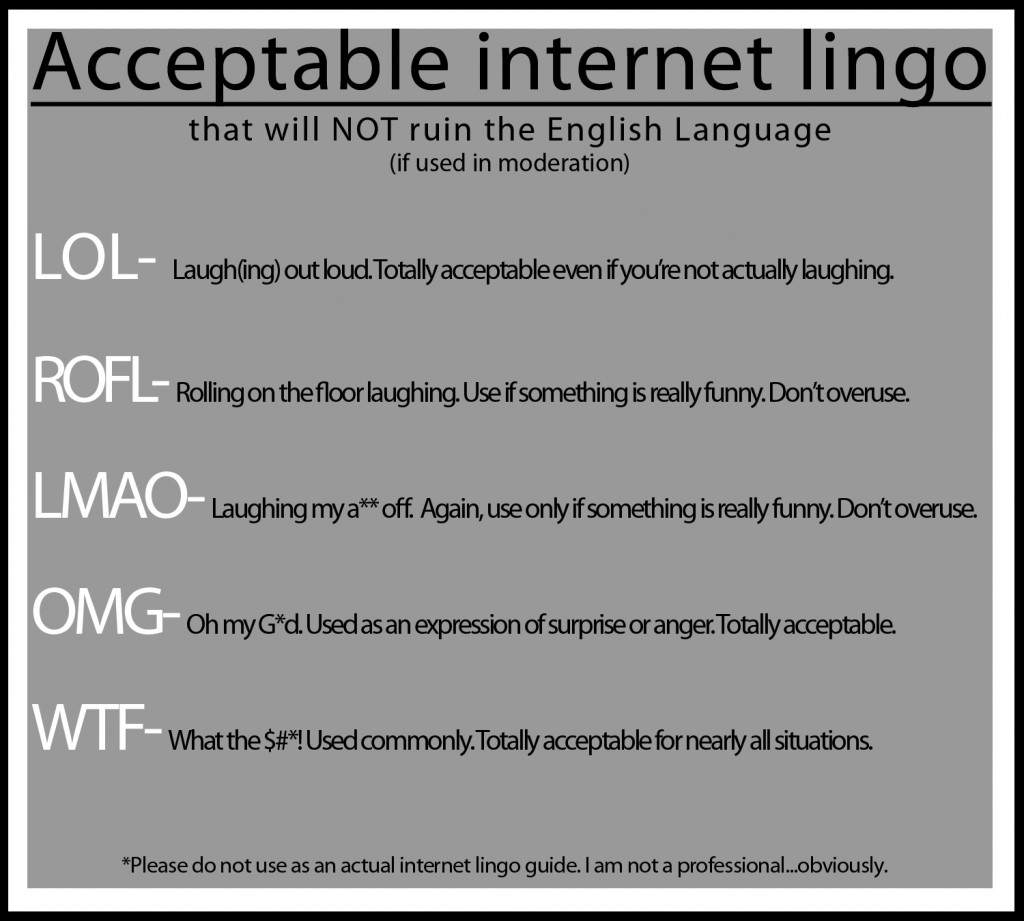“lawl grl i luv da way u did ur hair! Luks so kewl!”
Give me a break! Is that even English?!
Internet speak may look ridiculous, but it seems as though this is the direction the English language is taking.
The more popular instant communication gets, the more our language deteriorates. Facebook, Google+, instant messaging and text messaging make it easy to get away with lazy grammar, spelling and punctuation.
People with college educations, master’s degrees and successful business people don’t even blink an eye most of the time while reading their friends’ status updates.
This Internet speak has become second nature for a large portion of society.
What many of these English language abusers don’t understand is that most of their shortcuts are barely shortcuts at all.
Slang like “ur” is barely less time consuming than typing out “you’re.” The commonly used “wut” is one, yes, ONE, character shorter than the proper English word “what.”
So what’s the point of using shortcut spellings when the real spelling is barely longer?
Internet speak is being accepted more readily as the days go by. Why can’t proper language be used instead of this new form of laziness?
It may be because today’s youth cares less and less about their grammar and spelling.
They pay less attention in school and more to what their friend just posted on Facebook. We are socially connected all the time.
A professor states a “no-cell phone policy” in their syllabus; you can bet at least one person is breaking that rule each class period.
This 24/7 connection is a distraction from learning.
In college, students should already know the difference between “you’re” and “your”; “their”, “they’re”, and “there”; and when to use “then” as opposed to “than”.
This internet speak is making it acceptable to use all the variations interchangeably, despite the fact that the meanings are different.
Because of this widespread acceptance, society is allowing itself to slip deeper and deeper into the hole of lazy language use.
What happened to the days of friends who edit other friends’ essays?
It probably does still happen, but because of this new widely accepted language, how can you trust that your friend (who just happened to post a Facebook status even an English scholar wouldn’t be able to decipher) is going to make sure your essay is grammatically sound and displaying proper punctuation?
I can’t trust someone to edit any of my schoolwork when I become infuriated every time I read one of his or her “wall” posts.
Recently, language on the Internet has deteriorated to comedic proportions.
Most days, I can’t help but laugh at the ridiculous statuses I read on Facebook.
The sheer laziness that people portray while typing simple words astounds me.
Is it seriously that difficult to use the built-in Facebook spell-check?
Because I’m blunt and easily irritated, I have corrected spelling and grammar errors on other people’s Facebook statuses on more than one occasion. And, on more than one occasion people use the excuse “I was just typing fast”.
Well excuse me! I’m sorry I just rained on your speed-typing parade! Obviously fast-typing isn’t your forte!
But seriously, being concise about spelling, grammar and punctuation on the Internet can work wonders in your academic or professional life.
It’s hard to argue that the way you spell and write on your personal Facebook page won’t bleed into your professional writing. And honestly, how can it not? Practicing bad habits makes those bad habits stick and makes them second nature.
Instead of using the skills that were taught in high school and college every chance possible, young adults are letting themselves slip away from healthy literary habits.
Of course, language is constantly changing and evolving. Is today’s internet speak what you want people to find normal in twenty years?
I would rather the language not evolve into something so primitive and thoughtless.
With just a little bit of effort, our generation can form the future of the English language. Turning our backs on lazy Internet lingo can really make a difference.
Just ignoring common spelling and grammar is offensive. It is offensive to me and probably to the people who worked so hard to begin inventing the English language way back in the 7th century.
Please, MSU, start being concious of what you type. It could just affect the future of the English language in more ways than you know.
Be aware! Save future generations from an embarassing language!










